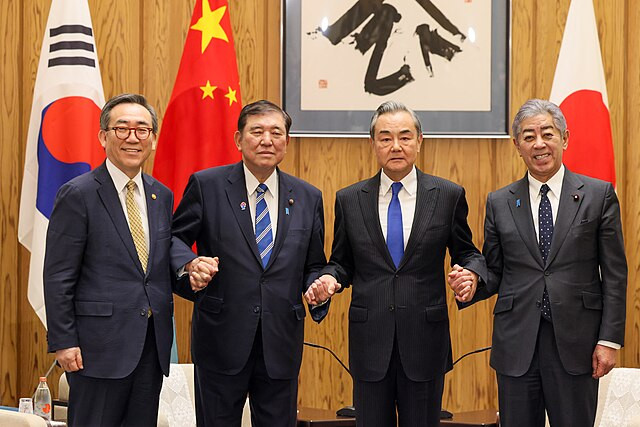Top diplomats from Japan, China, and South Korea met Saturday in Tokyo to strengthen trilateral cooperation as geopolitical tensions escalate across the region. The foreign ministers agreed to coordinate on economic, demographic, and security challenges while laying groundwork for a leaders' summit later this year.
Japanese Foreign Minister Takeshi Iwaya, Chinese Foreign Minister Wang Yi, and South Korean Foreign Minister Cho Tae-yul emphasized mutual interests in tackling declining birthrates, aging populations, disaster response, and advancing the green economy. Speaking at a joint press conference after the meeting, Iwaya said the three nations would promote "mutual understanding and trust" to address generational and cross-border issues.
"Given the increasingly severe international situation, I believe we may truly be at a turning point in history," Iwaya said, citing heightened global instability and power realignments.
Iwaya reiterated Tokyo's concerns about North Korea's nuclear and missile programs, as well as its deepening cooperation with Russia. He stressed the importance of achieving "full denuclearization" of the Korean Peninsula under United Nations Security Council resolutions and condemned unilateral actions to alter the regional status quo, a pointed reference to China's expanding military activities.
South Korea's Cho Tae-yul echoed those concerns, calling on China to use its influence to curb Pyongyang's weapons development. "I also stressed that illegal military cooperation between Russia and North Korea should stop immediately, and that North Korea should not be rewarded for its wrongdoings in the course of bringing about the end of the war in Ukraine," Cho stated.
China's Wang Yi, however, sought to shift focus toward economic integration. He proposed restarting negotiations on a trilateral free trade agreement and advocated for expanding membership in the Regional Comprehensive Economic Partnership (RCEP), the 15-nation trade pact. "Our three nations have a combined population of nearly 1.6 billion and an economic output exceeding $24 trillion. With our vast markets and great potential, we can exert significant influence," Wang said.
Despite gestures toward economic collaboration, sharp divisions remain. Japan and South Korea, both key U.S. allies, have voiced growing unease over China's support for North Korea and Russia, as well as its military pressure on Taiwan.
Saturday's discussions were followed by the first high-level Japan-China economic dialogue since 2019, involving officials from both countries' finance, labor, transportation, health, and environmental ministries. Wang characterized the dialogue as crucial to fostering "comprehensive and mutually strategic relations," while cautioning against rising protectionism and the "politicizing of science and technology," an indirect criticism of U.S. trade policies under President Donald Trump.
Among the economic issues, progress was acknowledged regarding China's ongoing ban on Japanese seafood imports. Beijing imposed the ban following Japan's release of treated radioactive wastewater from the Fukushima Daiichi nuclear plant in August 2023. Iwaya indicated that talks with Wang included discussion of lifting the embargo, though no immediate resolution was announced.






